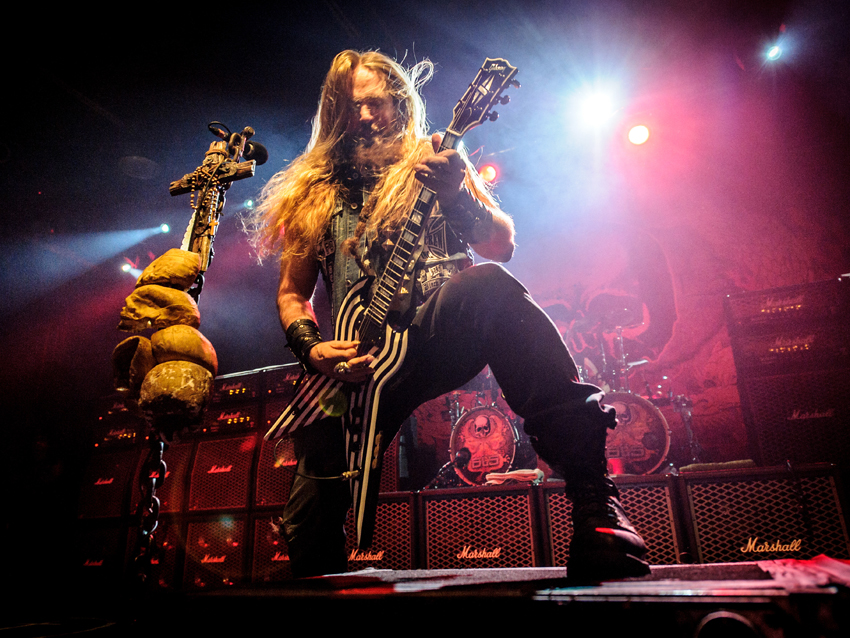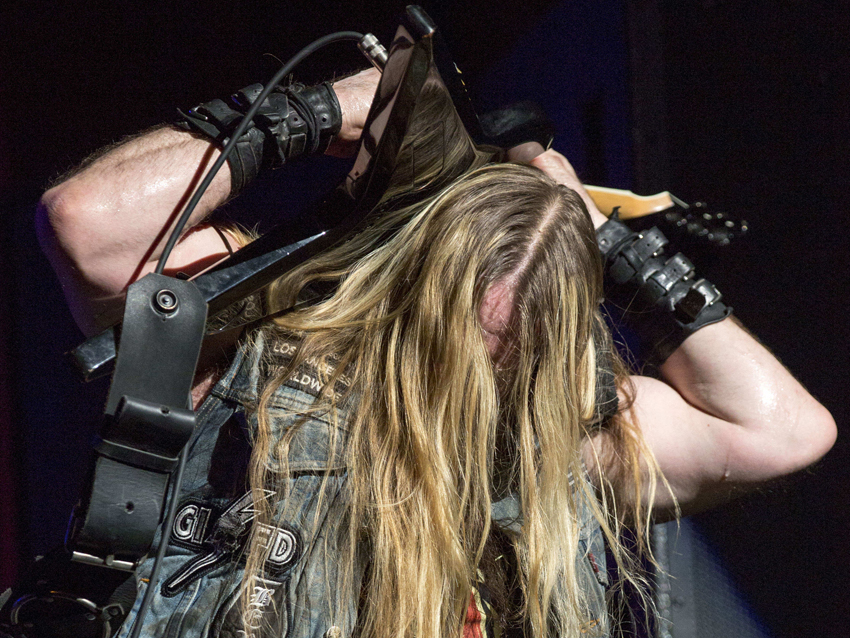
Zakk Wylde on recording Black Label Society's Catacombs Of The Black Vatican
In addition to being one of rock's greatest guitar masters, Black Label Society leader Zakk Wylde is also one of its most skilled and colorful raconteurs. Asked to explain the title of the band's ninth studio album, the powerfully rifftastic Catacombs Of The Black Vatican, and he's out of the gate like a champ.
"My studio is called the Black Vatican," he says. "I painted it black like that Anton LeVay guy with the black house. My wife, Barbaranne, she said, ‘Painting the place black. What are you, 12 years old?’ And I said, ‘No. I take offense to that – I’m 13. And I’m in Black Label Society, not Brown Label Society. You’re just lucky you’re not married to Jimi Hendrix; otherwise, that thing would be painted purple!’”
He lets out a deep, hearty chortle, then adds, "And the catacombs represent my gaping asshole after 25 years in the music business. Believe me, it’s dark and it's cavernous, and there’s a lot of dead bodies in there. Nobody wants to go there, pal.”
When it comes to interviews, as he is on stage or on record, Wylde never phones it in – even when calling from the road to talk about the new album, ballads that aren't really ballads, and why he doesn't stockpiles riffs.
I'm curious – have you heard from any members of the clergy about the new album's title?
[Laughs] “There hasn’t been any kind of official response, but I’m not worried. I’m a good Catholic boy. In an inadvertent way, I’m promoting Catholicism with this record. You know, it’s like how I call people ‘Father Joe’ or whatever. I call the greats ‘Saint Rhoads,’ ‘Saint Hendrix,’ ‘Pope Page,’ ‘Father Iommi,’ and so on – all the gods who passed away who are now up in God’s tavern. No, bro, I’m a good Catholic boy – people know that.”
With very few exceptions, you've produced the band's albums yourself. How do you rate yourself as a producer?
“You know, it's just a matter of letting stuff happen. If you’re producing Salvador Dali, you’ve gotta let him be himself, you know? Let him paint and do his thing. It’s like being a coach: If you’ve got great players, let ‘em play. When I’m producing a record, I don’t tell the guys what to play. That defeats the whole purpose of having them around. I’ll show them the riff and I’ll say, ‘OK, here’s what I got. What do you have for that?’ If I have a certain idea for a drumbeat or a bassline, sure, I’ll tell them. But I want to know what they have. Surprise me, you know?
“As far as my own stuff goes, I’ll bounce the stuff off the guys to see what they think. I'll say to [bassist] JD [DeServio], 'Bro, what do you like best, the Al Di Meola solo or the David Gilmour one?’ And if he’s like, ‘I’m feelin’ the Comfortably Numb solo,’ then I’ll bag the Al D shred thing and I’ll go with Dave. Or maybe I’ll combine them and do a Neal Schon thing. I’m pretty easygoing in the studio. Once I know that everything sounds great, that I've got the sonics down, then I’ll let things happen.
“Put it this way: Roger Clemens is gonna pitch like Roger Clemens – you can’t make him pitch like Greg Maddux. Greg isn’t an overpowering pitcher; he’s more of a finesse guy. Same with players. If you’ve got the right guys in the room, you don’t need to tell them a bunch of shit. Think about if you were producing the first Guns N’ Roses record. It’s like, what do you need to do there? Nothing. You just hope the guys show up, and you keep supplying them with endless vats of booze and whatever else they had going on. You just turn on the tape and get it down."

Inspiration
You like to make your records pretty quickly, don’t you?
“Oh, yeah. I did this record in 25 days. It’s all in the riffs. You listen to this record, and it’s all riffs. I mean, let’s be real: You listen to Led Zeppelin’s first album, and you’ve got Dazed And Confused, Communication Breakdown, How Many More Times – everything on that record is a riff. My attitude is, if you’ve got the cool riffs, you’re halfway home. The riffs and the tunes. When you got a new Beatles record, did you say, ‘Hey, I hope George Harrison is playing faster on this record’? No, you just wanted the tunes to be great, and they were.”
Shades Of Gray is a beautiful ballad. How does a song like that happen? It’s less dependent on the big riff.
“I wrote that one when we were touring. I don’t know if I’m in a different mood or anything when I write the slow stuff – it just happens. Angel Of Mercy I wrote on piano, just sitting in the house playing around. After it was done, we moved it to the guitar. We did the same with Mama I’m Comin’ Home. I wrote it on piano, and then when we got in the studio I put it on the 12-string.
“I know what you mean, though. You sit down at the piano or with an acoustic guitar, and things will come out differently than when you’ve got the electric on and you’re crankin’ through the Marshalls. You pick up an acoustic and you’re going to write something like Wild Horses or Melissa. The sound of the instrument is going to change the way you write. Heart Of Gold – you might write something like that.”
So it’s not as if you have something in your head and that makes you go to the piano or acoustic guitar but not an electric. The idea happens because of what you’re playing, not the other way around.
“It depends, really. Without a doubt, I could have a melody in my head and I’ll start singing, and then I’ll go to the piano and figure out where the chords are. But I could start with nothing, too. I’ll get a big cup of java in the morning and sit down at the piano, and I’ll just start jamming, just playing anything. Before you know it – ‘Oh, cool. I’ve got a song.’ A song wasn’t there and now it is.
“Sometimes I’ll hear a song and it’ll inspire me to sit down and write. I’ll hear a Bob Seger thing, something like Against The Wind, and I’ll be like, 'I gotta write something in that vein.' A song like that is killer. Piano and acoustic guitar put you in a certain kind of mood. It’s just like when I plug into a Marshall. I lock the pedal and keep the volume low, put a little reverb on – it sounds like I’m playing fuckin’ Madison Square Garden with nobody in there. So that’ll inspire you to write Whole Lotta Love or Into The Void or some sort of Sabbath-y/Zeppelin-y thing.”

The softer side
What about the other ballad, Scars? Was that on piano?
“No, I wrote that on acoustic guitar. So that was acoustic, Angel Of Mercy was piano, and Shades Of Gray was acoustic guitar.”
Angel Of Mercy and Shades Of Gray have pretty ripping solos, but on Scars your lead playing is more leisurely paced. Did you try something more frenetic at first, but you opted for the slower solo?
“You know, I’m flipping through the Rolodex of knowledge, referencing the things that guys before me did. Obviously, that Scars solo is more of a Dickey Betts thing. I took my loud guitar tone, turned the distortion pedals off – and there was no chorus or anything like that, because Dickey’s tone is straight in – and I went for it on the middle pickup. I took a couple passes and I was good.
“What I usually do is, I’ll have Father Adam, our Irish-Catholic rabbi engineer supreme, burn me a CD of the backing tracks, and after the rest of the guys leave I’ll do play around with solos and do my homework. Sometimes it’s from the Saint Rhoads school of writing – bits and pieces – or else it’s Neal Schon. Neal’s the master of that; he’ll play the melody in the beginning or the middle, and then he’ll put the afterburners on at the end. Or Pope Page. Angel Of Mercy is kind of like me doing Pope Page with some Al D.”
It’s interesting that we’ve been talking so much about your ballads. A lot of hard rock and metal musicians don’t want to go near the softer side of things.
“I’ve never been that way. You know, I love Elton John, I love The Beatles, the Stones… They had amazing slower songs. But see, I don’t consider certain songs ballads. Back in the ‘80s, you had your power ballads, but that stuff was different. I don’t consider Against The Wind a cheesy ‘80s ballad; it’s just an amazing song that’s slower than the rock stuff. Zeppelin did Going To California, the Stones did Angie and Wild Horses – those are phenomenal. They're great slower songs. If some bands don’t want to change the pace, that’s OK – it just means there’s more stuff for us to write.”
But we do have to talk about one of your serious, over-the-top rock moments on the new album. Damn The Flood, that solo – holy cow!
“Yeah, that was the John McLaughlin influence. The John McLaughlin-Frank Marino pentatonic licks of doom. I did that in one pass, man. I could play it back live for you right now. We do the thing every night, so I gotta know how to play it. In the studio, we got up to that part, and it just seemed like it needed a fast solo, something really rippin’. And I mean fast for the sake of fast, too, not fast with some melody to it; sometimes it’s OK just to put the pedal down and go fucking nuts.”

The power of the riff
Any new guitars you used on the record?
“Well, I used Blue Balls on a couple of solos – that’s the guitar that got stolen on the Hendrix tour in Chicago. [Editor's note: The guitar was recently recovered.] I used him on Angel Of Mercy, Scars, Shades Of Gray. I also used him on Nomad and Hell And Fire – those are bonus tracks. I’ve got two Juniors. Michael Beinhorn gave me a red double-cutaway Junior, a ’58 that Les Paul signed. Ozzy got me a ’57 single cut tobacco burst, like the kind Leslie West has. Those are the two guitars I use on the clean stuff. They sound amazing ‘cause the wood is so old.”
What about the acoustics you used?
“I used my Gibson J-200s, and I used my Epi Masterbilts. Those things sound awesome, man, especially with piano.”
What kind of piano are you playing?
“The piano I have up in the Vatican is the Kawai. That’s the first piano I ever bought when I started making money with the boss. Then I have the Baldwin, too. I’m a Gibson guy, and Gibson owns Baldwin. I got the Baldwin out with me on the road.”
We were talking riffs, but let me ask you: Do you ever come up with riffs that don’t grow up to be songs?
“No, that never happens. If you’ve got a riff, you’ve got a song. When something cool comes to you, you’ll figure out the rest. You'll find a way to bend it and cram it into a song. Or it just becomes its own song – the riff is the song. I don’t have parts sitting around that don’t know where to go. Some guys hold on to riffs. They have tapes and tapes, all these boxes of riffs. I don’t do that. I’ve never gone through tapes of riffs that I came up with 10 or 20 years ago.
“Why would you wanna do that anyway? [Laughs] If a riff isn’t happening for you today, that's cool. So you wait until tomorrow when you’ve got a good one. It’s like if we went out looking for dinosaur bones. You can’t find anything, it's the end of the day, so you go, ‘OK, let’s go get a steak.’ You know the bones are out there somewhere, so you come back the next day and find ‘em. It’ll happen. No reason to get pissed off or depressed and come down with writer’s block. The bones are there. Keep digging.”
Joe is a freelance journalist who has, over the past few decades, interviewed hundreds of guitarists for Guitar World, Guitar Player, MusicRadar and Classic Rock. He is also a former editor of Guitar World, contributing writer for Guitar Aficionado and VP of A&R for Island Records. He’s an enthusiastic guitarist, but he’s nowhere near the likes of the people he interviews. Surprisingly, his skills are more suited to the drums. If you need a drummer for your Beatles tribute band, look him up.
